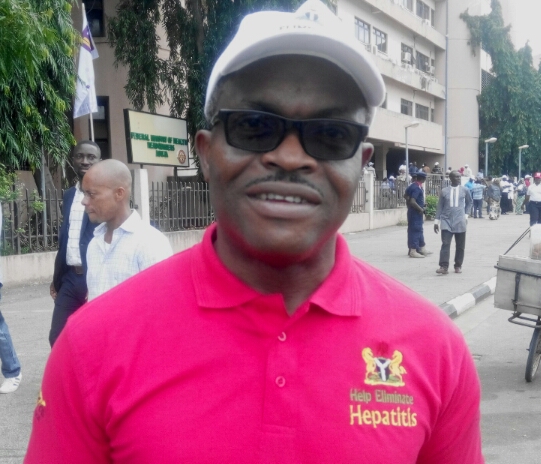● We support Nigeria against virus – WHO‘

ABUJA – Testing for hepatitis in health facilities remains a major strategy for controlling the virus, public health specialist and Head, Prevention, National AIDS and STI Control Programme, Federal Ministry of Health, Dr. Chukwuma Anyaike, has said.
Anyaike stated this when he led hundreds of health experts, well-meaning citizens and representatives of health-related non-governmental organizations in an awareness creation walk on the disease in Abuja at the weekend. His department also offered free screening for residents of the nation’s capital at the Federal Secretariat.
He said with testing, those who are negative could go for preventive vaccination against the disease, while persons who are positive would receive medical counsels and treatment they need from trained experts.
Hepatitis, an inflammation of the liver at its complicated stage, could progress to fibrosis, cirrhosis or liver cancer.There are five main hepatitis viruses, referred to as types A, B, C, D and E. In particular, types B and C lead to chronic disease in hundreds of millions of people and, together, are the most common cause of liver cirrhosis and cancer.
It is estimated that hepatitis kills more than HIV/AID and related ailments, worldwide.
Anyaike however said that symptoms of hepatitis virus are similar to that of malaria. “The symptoms of viral hepatitis, just like malaria and others, you have tiredness, you may have yellowness of the eyes, and sometimes you may not have it. Then, you have fever, abdominal pain, weakness of the body and thereabouts.
“The problem we have is that most of these symptoms are in the same direction with malaria.“Since we are in malaria-endemic region, what we now do is to inform the health workers to have in-depth suspicion. When someone comes in for care, you don’t just screen for malaria, you screen for hepatitis because they all run the same early symptoms,” he said.

He added that after the early symptoms, there could be complications which include abdominal swelling, liver fibrosis and could eventually result in cancer of the liver, adding that HIV patients could also have hepatitis.
According to him, hepatitis patients could only be treated free in the country if there is strong collaboration between the private sector and government on procurement of medications.
Speaking on the significance of the event, the public health expert said: “The significance of this is that today, we are joining the whole world to commemorate the World Hepatitis Day, which comes up annually on 28th July. The World Hepatitis Day is the day agreed among the 194 member states that keep this day for awareness creation, sensitization, advocacy and resource mobilization for the reduction viral hepatitis which is a public health threat to the whole world and Nigeria in particular…The significance of this is that we want to create the awareness.
“You can see the number of people that turned up today, just because we have a good partnership. Everyone is involved, the private sector, the public sector, the para-military, even the media; to ensure we pass the message down that people should get tested.
“If you test negative, go for the vaccine, if you test positive, you go for proper evaluation, and then for treatment.Meanwhile,”
Acting Country Representative of the World Health Organization in Nigeria;theRex Mpazanje, said at the event: “Quite a number of people who are infected are never aware of it. Without health screening, nobody will be aware. It’s until you are screened or until you have developed complications in terms of liver disease or indeed in terms of cancer you realise that you have had hepatitis infection all along.
“So one of the key messages that will be going on is really to encourage people to take proactive action to have screening and also to still encourage families, women, mothers to make sure that their children do receive the Pentavalent 3 vaccination which contains the hepatitis immunization.”

